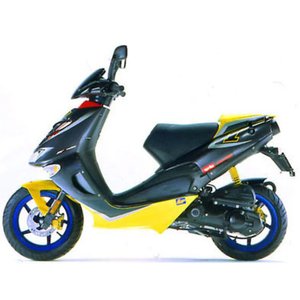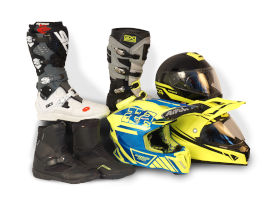Aprilia SR 50 AC (1992-1996): A Youthful Icon Revisited
Introduction
The Aprilia SR 50 AC represents a specific moment in two-wheeled history - the early 1990s scooter renaissance. Designed as a gateway to motorcycling for European youth, this air-cooled two-stroke machine became a cultural phenomenon. Let's explore why this particular generation (1992-1996) remains memorable and how it holds up through modern eyes.
Design & Ergonomics
At first glance, the SR 50 AC's proportions scream "90s cool." The angular bodywork with its aggressive headlight cluster and stepped saddle creates a sporty silhouette that still turns heads. With an 815mm seat height (32.1 inches), it remains accessible for shorter riders while offering enough legroom for taller adolescents. The flat floorboard provides practical storage space - perfect for school bags or groceries.
The analog dashboard keeps things refreshingly simple: just a speedometer and warning lights. Controls are light and intuitive, with Aprilia's trademark focus on rider ergonomics evident in the well-positioned handlebars. The plastic panels feel durable but show their age in terms of colorfastness - a common issue we notice on surviving examples.
Engine & Performance
The heart of this machine is its 49cc single-cylinder two-stroke engine. Output figures vary between 1.9kW (2.7hp) and 3kW (4.2hp) depending on market restrictions, but there's unanimous agreement about its character. From the moment you twist the throttle, that signature two-stroke scream erupts - a nostalgic soundtrack missing from modern electric scooters.
Performance is best described as "enthusiastic" rather than fast. The lightweight 85kg (187lb) package helps it reach 45-50km/h (28-31mph) in urban conditions. What it lacks in outright speed, it makes up for in responsiveness. The direct drive system (no gears) delivers instant torque off the line, making it perfect for zipping between traffic lights.
Maintenance-wise, the two-stroke design means oil mixing (1.1L capacity) and regular spark plug checks (NGK BR7HS/BR7HIX at 0.7mm gap). We noticed some vibration at the 1800rpm idle, but it smooths out once moving. The air-cooling system proves adequate for city use but demands careful monitoring during sustained high-speed runs.
Handling & Ride Experience
Where the SR 50 AC truly shines is in its handling. The 30mm front forks with 100ml of SAE 15W oil provide surprisingly competent damping, while the rear suspension handles urban imperfections with teenage resilience. Recommended tire pressures (1.9 bar front/27.5psi, 2.1 bar rear/30.4psi) strike a good balance between grip and rolling resistance.
Through tight corners, the lightweight chassis encourages leaning. The 10-inch wheels feel twitchy at first but soon reveal their genius in congested cities. Braking is adequate for the performance, though we'd recommend upgrading to sintered pads for modern traffic conditions. The mechanical drum brakes require regular adjustment but reward with progressive feel.
Competition
In its era, the SR 50 AC faced fierce rivals:
- Honda Tact: More utilitarian but lacking Aprilia's sporty flair
- Yamaha Jog: Lighter weight but less stable at speed
- Peugeot Speedfight: Later competitor with water-cooling advantage
Where Aprilia stood out was in creating a "motorcycle-lite" experience. The riding position and controls felt closer to proper bikes than the scooter norm. While Japanese competitors focused on reliability, Aprilia injected Mediterranean passion into the segment. The trade-off came in maintenance complexity - those beautiful two-stroke engines demanded more care than four-stroke rivals.
Maintenance Essentials
Owning a 25+ year old SR 50 AC requires vigilance. Key considerations:
- Engine Care
- Use quality 2-stroke oil (synthetic blends work best)
- Clean/replace the NGK BR7HS spark plug every 3,000km (1,864mi)
-
Check compression regularly - worn rings are common
-
Transmission
- Final drive oil (110ml SAE 10W-30) changes every 5,000km (3,107mi)
-
Inspect drive belt for cracks and wear
-
Brakes
- DOT 4 fluid flush annually
-
Adjust drum brake shoes every 2,000km (1,243mi)
-
Suspension
- Replace fork oil every 10,000km (6,214mi)
-
Lubricate rear suspension linkages
-
Electrics
- Check stator output voltage regularly
- Clean contacts in the CDI unit
At MOTOPARTS.store, we recommend stocking up on: - NGK BR7HIX Iridium spark plugs - SAE 10W-30 final drive oil kits - DOT 4 brake fluid value packs - Fork seal replacement kits
The Modern Legacy
Riding the SR 50 AC today is a lesson in simple pleasures. It lacks modern conveniences like fuel injection or ABS, but compensates with pure mechanical engagement. The smell of two-stroke smoke, the mechanical buzz through the handlebars, the unassisted brakes - these create an authentic experience that's disappearing from urban mobility.
For collectors, finding unmodified examples is challenging. Many were customized with aftermarket exhausts or performance kits. We suggest preserving original parts while upgrading wear components - our store offers period-correct replacements alongside modern reliability upgrades.
Conclusion
The Aprilia SR 50 AC (1992-1996) represents more than just transportation - it's a cultural artifact from the golden age of two-stroke scooters. While newer models offer better efficiency and lower emissions, none replicate the raw character of this Italian icon. For current owners, maintaining these machines becomes an act of preservation. For newcomers, it offers an affordable entry into vintage two-wheeler culture.
Whether you're restoring a barn find or keeping a faithful daily runner alive, MOTOPARTS.store has the components to keep your SR 50 AC thriving. From genuine NGK spark plugs to suspension refresh kits, we enable your passion for this timeless scooter.
Image placeholder for maintenance diagram
Image placeholder for period advertisement
Specifications sheet
| Engine | |
|---|---|
| Stroke: | Two-stroke |
| Max power: | 3 kW | 4.0 hp |
| Fuel system: | Carburetor with automatic oil injection (2-stroke) |
| Displacement: | 49 ccm |
| Configuration: | Single |
| Number of cylinders: | 1 |
| Dimensions | |
|---|---|
| Seat height: | 815 mm (32.1 in) |
| Fuel tank capacity: | 6.0 L (1.6 US gal) |
| Drivetrain | |
|---|---|
| Final drive: | belt |
| Transmission: | CVT (Continuously Variable Transmission) |
| Maintenance | |
|---|---|
| Engine oil: | 2-stroke oil |
| Break fluid: | DOT 4 |
| Spark plugs: | NGK BR7HS or NGK BR7HIX |
| Gear oil type: | SAE 10W-30 |
| Spark plug gap: | 0.7 |
| Gear oil capacity: | 0.11 |
| Forks oil capacity: | 0.2 |
| Engine oil capacity: | 1.1 |
| Engine oil change interval: | N/A (2-stroke oil tank) |
| Valve clearance (intake, cold): | N/A (2-stroke engine) |
| Valve clearance (exhaust, cold): | N/A (2-stroke engine) |
| Recommended tire pressure (rear): | 2.1 bar (30 psi) |
| Recommended tire pressure (front): | 1.9 bar (28 psi) |
| Chassis and Suspension | |
|---|---|
| Front suspension: | Telescopic fork (30 mm stanchions) |



















